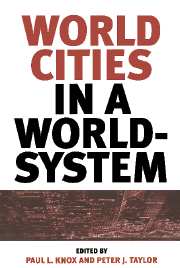Appendix - The world city hypothesis
Published online by Cambridge University Press: 07 October 2009
Summary
Some fifteen years ago, Manuel Castells (1972) and David Harvey (1973) revolutionized the study of urbanization and initiated a period of exciting and fruitful scholarship. Their special achievement was to link city forming processes to the larger historical movement of industrial capitalism. Henceforth, the city was no longer to be interpreted as a social ecology, subject to natural forces inherent in the dynamics of population and space; it came to be viewed instead as a product of specifically social forces set in motion by capitalist relations of production. Class conflict became central to the new view of how cities evolved.
Only in recent years, however, has the study of cities been directly connected to the world economy. This new approach sharpened insights into processes of urban change; it also offered a needed spatial perspective of an economy which seems increasingly oblivious to national boundaries. My purpose here is to state, as succinctly as I can, the main theses that link urbanization processes to global economic forces. The world city hypothesis, as I shall call these loosely joined statements, is primarily intended as a framework for research. It is neither a theory nor a universal generalization about cities, but a starting point for political enquiry.
- Type
- Chapter
- Information
- World Cities in a World-System , pp. 315 - 331Publisher: Cambridge University PressPrint publication year: 1995
- 27
- Cited by



